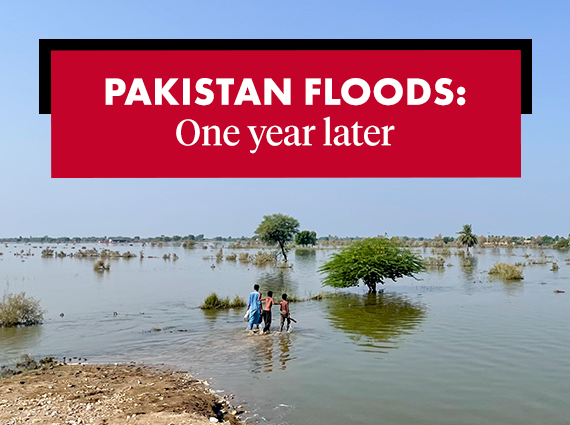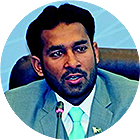 Dear friend,
Dear friend,
It has been just one year since Pakistan endured intense rainfall that caused devastating, months-long flooding across the country. While average, seasonal monsoon rains usually support agriculture in Pakistan, the 2022 season was unlike any other in recent memory — with flooding inundating one-third of the country.
As a Program Officer Humanitarian for Mercy Corps in Pakistan, I met so many families who lost everything. The floods killed more than 1,700 people, and nearly 8 million people have been forced to flee their homes, staying in tents on the side of the road, schools, or displacement camps.
Mercy Corps has been working in Pakistan for decades, so when the flood emergency began, we were ready to mobilize — providing food, clean drinking water, latrines, handwashing stations, shelters, and cash assistance. We also helped provide health and medical assistance for families, including special services for pregnant women and new mothers, children, the elderly, and people with disabilities.
I invite you to read my recent article and see the photos below for a snapshot of our year-long response in Pakistan.
This humanitarian and climate catastrophe is yet another example of how countries that contribute the least to global warming are the ones that suffer the most. Pakistan contributes less than 1% of the world’s greenhouse gas emissions, while this year’s monsoon season has already claimed more lives and more homes in Pakistan.
Mercy Corps has been working in Pakistan since 1986 and was one of the first international relief agencies to respond on the ground to the 2022 floods. We will continue to support communities as they grapple with the aftermath of this crisis and the continued effects of climate change.
Your support helps make our emergency responses possible in places like Pakistan, Ukraine, and Sudan, and in 40+ countries worldwide.
Across the communities where we collaborate with local organizations to provide recovery and reconstruction, I am heartened to see that our work provides a ray of hope for families who are now starting to cope and adapt after tragedy.
Thank you for your commitment to helping communities facing conflict and climate change crises around the world.
With eternal gratitude,
 |
 |
Muhammad Wasif Bashir Babar,
Mercy Corps Program Officer Humanitarian, Pakistan
|
P.S. In Pakistan, Ukraine, Syria, Haiti — and 40+ countries worldwide, we’re there when disasters strike — and in the critical months of recovery that follow. Your generosity fuels this work. Would you consider giving
$7 or more
today to our Global Emergency Response Fund?
|

